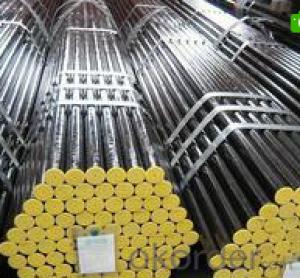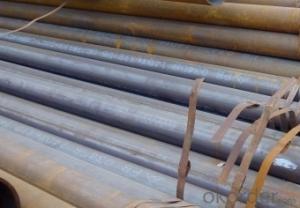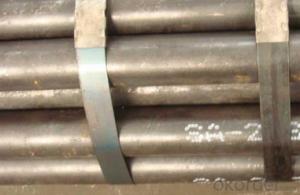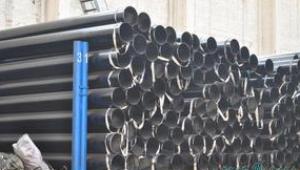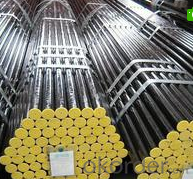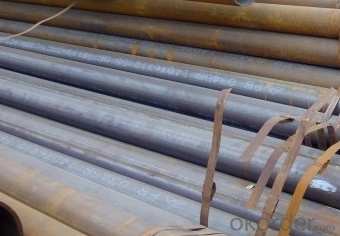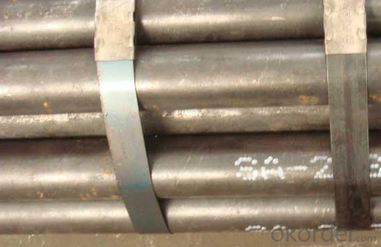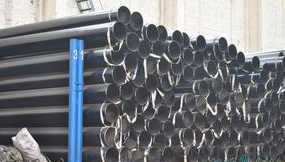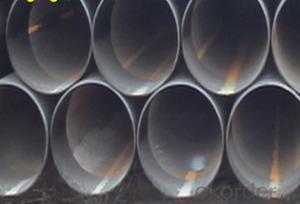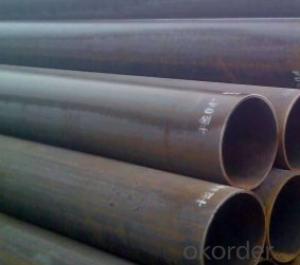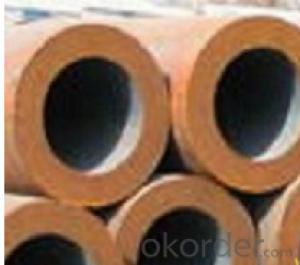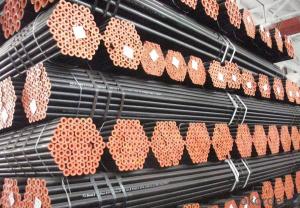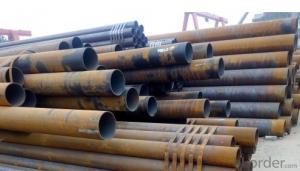Schedule 40 ASTM A53 API 5L GR.B Carbon Seamless Steel Tubes A335P91 CNBM
- Loading Port:
- Qingdao
- Payment Terms:
- TT OR LC
- Min Order Qty:
- 10 pc
- Supply Capability:
- 30 pc/month
OKorder Service Pledge
OKorder Financial Service
You Might Also Like
Quick Details
| Thickness: | 2.0 - 85 mm | Section Shape: | Round | Outer Diameter: | 17 - 914.4 mm |
| Secondary Or Not: | Non-secondary | Application: | Oil Pipe | ||
| Technique: | Hot Rolled | Certification: | API | Surface Treatment: | VARNISH PAITING |
| Special Pipe: | API Pipe | Alloy Or Not: | Non-alloy | END: | PLAIN,BEVELED OR THREADED |
| Grade: | 10#,20#,16Mn,A106(B,C),A210,A335 P5,A335 P91,A53(A,B),API J55,API K55,Q195,Q235,Q345,St37,St52,10#-45#,A53-A369,API J55-API P110,Q195-Q345,ST35-ST52 | Standard: | API 5CT,API 5L,ASME B36.19M-2004,ASTM A106-2006,ASTM A179-1990,ASTM A182-2001,ASTM A53-2007,BS 1387,DIN 1629/3,DIN EN 10216-1-2004,GB 5310-1995,GB/T 3091-2001,GB/T 8162-1999,GB/T 8163-1999,JIS G3454-2007,API,ASTM,BS,DIN,GB,JIS |
Packaging & Delivery
| Packaging Detail: | standard packing suitable shipping by sea.fixed length as customers' requirements, or SRL or DRL. Varnish, painting or galvanized, or FBE ,2PE,3PE 3pp coating,bevelled/plain/threaded ends with caps, packing in bundle (OD smaller than 141.3mm) big sizes packing in loose, marking as required. Shipped by sea,by air,by train . or some samples shipped by DHL,EMS,TNT,FEDEX ect. Length shorter than 5.85m should be shipped by 20' container, 5.85-12m shipped by 40' container. |
| Delivery Detail: | 7-35 days after advance payment |
Product Description
Seamless steel pipes, a large number of used pipes conveying fluids, such as transport oil, natural gas, gas, water pipes and some solid materials, and so on. Compared to other steel and solid steel bar, the same torsional strength in bending, lighter, is an economic cross-section steel, widely used in the manufacture of structural parts and mechanical parts, such as drill pipe, automotive drive shafts, bicycle rack and construction using steel scaffolding ring with steel pipe manufacturing parts, can improve material utilization, simplify the manufacturing process, saving material and machining time, such as bearing rings, jack sets, has been widely used to manufacture steel. Steel or a variety of conventional weapons indispensable material, gun barrels to make steel. Steel shapes in different cross-sectional area can be divided into tube and shaped tubes. As in the perimeter of equal conditions, the largest area of a circle with a circular tube can carry more fluid. In addition, the circular cross section to withstand internal or external radial pressure, the force is uniform, so the vast majority of the pipe is pipe.
- Q: What are the different methods of transporting steel pipes?
- There are several methods of transporting steel pipes, including by truck, train, ship, and pipeline.
- Q: Are steel pipes suitable for industrial cooling systems?
- Indeed, steel pipes prove to be generally well suited for industrial cooling systems. Being a robust and long-lasting material, steel can endure the elevated pressures and temperature fluctuations commonly encountered in such systems. Furthermore, its exceptional resistance to corrosion renders it an ideal choice for utilization with water or other coolants. Moreover, steel pipes exhibit commendable thermal conductivity, facilitating efficient heat transfer during the cooling procedure. Additionally, these pipes are conveniently accessible and cost-effective, rendering them highly favored within industrial settings.
- Q: How are steel pipes used in the construction of railways?
- Steel pipes are used in the construction of railways for various purposes, including the installation of track support structures, drainage systems, and signaling equipment. They provide strength and durability, ensuring the stability and longevity of railway tracks, while also facilitating the efficient flow of water and the installation of crucial communication and signaling components.
- Q: What are the different end finishes available for steel pipes?
- Some of the different end finishes available for steel pipes include plain ends, beveled ends, threaded ends, grooved ends, and flanged ends.
- Q: How are steel pipes tested for leakage?
- Steel pipes are tested for leakage through various methods, including hydrostatic testing and ultrasonic testing. In hydrostatic testing, the pipes are filled with water under high pressure to check for any leaks or weaknesses in the welds or seams. Ultrasonic testing involves using high-frequency sound waves to detect any defects or cracks in the pipes. Both methods are effective in ensuring the integrity and leak-free performance of steel pipes.
- Q: How are steel pipes repaired if they are damaged?
- Steel pipes can be repaired if they are damaged through various methods such as welding, patching, or using pipe clamps.
- Q: How are steel pipes used in the construction of underground parking garages?
- Steel pipes are commonly used in the construction of underground parking garages for various purposes such as drainage, ventilation, and structural support. They are used as conduits for underground utilities, including water supply and sewage systems. Additionally, steel pipes are often used as piling or foundation elements to provide stability and support to the structure, especially in areas with challenging soil conditions. Overall, steel pipes play a crucial role in ensuring the functionality and durability of underground parking garages.
- Q: What is the difference between internal threading and external threading of steel pipes?
- Internal threading and external threading are two different methods used to create threads on steel pipes. The main difference between them lies in the location of the threads. Internal threading refers to the process of cutting threads on the inside surface of a steel pipe. This method involves using a tool or a die to remove material from the inner diameter of the pipe, creating a helical groove. The resulting threads can be used to connect the pipe to other components, such as fittings or valves. On the other hand, external threading involves cutting threads on the outside surface of a steel pipe. This process usually requires the use of a threading die or a lathe to remove material from the outer diameter of the pipe, leaving behind a helical groove. The external threads allow the pipe to be connected to other components or fittings that have corresponding internal threads. The choice between internal and external threading depends on the specific application and the requirements of the project. Internal threading is often preferred when the pipe needs to be connected to components that have external threads, such as fittings or valves. External threading, on the other hand, is typically used when the pipe needs to be connected to components with internal threads, or when the pipe is intended to be screwed into a threaded hole or coupling. In summary, the main difference between internal threading and external threading of steel pipes is the location of the threads – internal threads are cut on the inside surface of the pipe, while external threads are cut on the outside surface. The choice between these methods depends on the specific application and the type of connections required.
- Q: What is the difference between steel pipe and PVC conduit?
- Steel pipe and PVC conduit serve distinct purposes and possess unique characteristics. The material composition stands as a primary distinction between steel pipe and PVC conduit. Steel pipe consists of robust and enduring materials, typically carbon steel or stainless steel, rendering it sturdy and resistant to impact. Consequently, it finds its utility in heavy-duty applications such as plumbing or structural support. In contrast, PVC conduit is constructed from polyvinyl chloride, a type of plastic. PVC's lightweight, flexibility, and ease of manipulation make it ideal for electrical purposes like safeguarding and directing electrical wires. Resistance to corrosion represents another disparity between the two. Steel pipe exhibits greater resistance to corrosion than PVC conduit, particularly when fortified with protective layers like zinc or epoxy. This makes steel pipe suitable for outdoor applications, subterranean installations, or environments with high moisture or corrosive elements. PVC conduit, while generally resistant to moisture and chemicals, may deteriorate over time when exposed to sunlight and can be harmed by specific chemicals. Consideration of cost becomes another factor. Steel pipe generally incurs greater expenses than PVC conduit due to its material and manufacturing process. Nonetheless, steel pipe's durability and extended lifespan establish it as a cost-effective selection in the long run, particularly for applications necessitating high strength and longevity. On the contrary, PVC conduit is comparatively inexpensive and readily accessible, rendering it a more affordable choice for numerous electrical projects. Lastly, installation methods differ between the two. Steel pipe is typically connected through threaded connections or welded joints, mandating specialized tools and skills. Conversely, PVC conduit can be effortlessly cut, assembled, and connected using PVC cement or fittings. This renders PVC conduit a more DIY-friendly option for electrical installations. In summary, steel pipe and PVC conduit diverge in terms of material composition, resistance to corrosion, cost, and installation methods. Steel pipe boasts strength, durability, and corrosion resistance, making it suitable for rigorous applications. PVC conduit, conversely, possesses lightness, flexibility, and affordability, rendering it ideal for electrical projects.
Send your message to us
Schedule 40 ASTM A53 API 5L GR.B Carbon Seamless Steel Tubes A335P91 CNBM
- Loading Port:
- Qingdao
- Payment Terms:
- TT OR LC
- Min Order Qty:
- 10 pc
- Supply Capability:
- 30 pc/month
OKorder Service Pledge
OKorder Financial Service
Similar products
Hot products
Hot Searches
Related keywords
